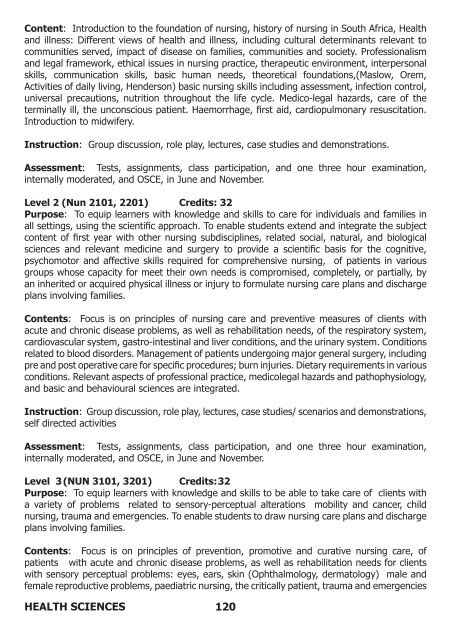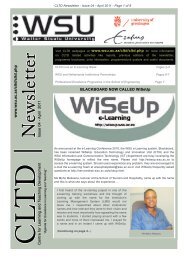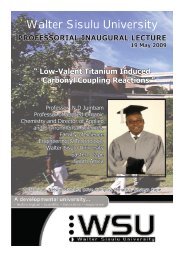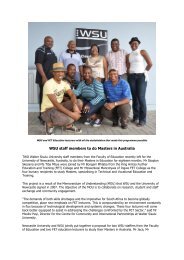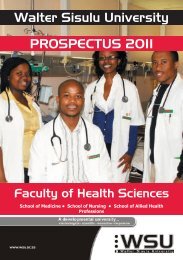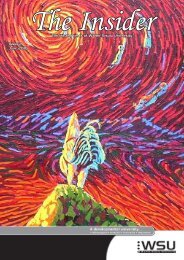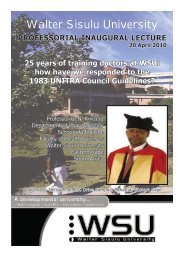Faculty Prospectus 2012 - Walter Sisulu University
Faculty Prospectus 2012 - Walter Sisulu University
Faculty Prospectus 2012 - Walter Sisulu University
You also want an ePaper? Increase the reach of your titles
YUMPU automatically turns print PDFs into web optimized ePapers that Google loves.
Content: Introduction to the foundation of nursing, history of nursing in South Africa, Health<br />
and illness: Different views of health and illness, including cultural determinants relevant to<br />
communities served, impact of disease on families, communities and society. Professionalism<br />
and legal framework, ethical issues in nursing practice, therapeutic environment, interpersonal<br />
skills, communication skills, basic human needs, theoretical foundations,(Maslow, Orem,<br />
Activities of daily living, Henderson) basic nursing skills including assessment, infection control,<br />
universal precautions, nutrition throughout the life cycle. Medico-legal hazards, care of the<br />
terminally ill, the unconscious patient. Haemorrhage, first aid, cardiopulmonary resuscitation.<br />
Introduction to midwifery.<br />
Instruction: Group discussion, role play, lectures, case studies and demonstrations.<br />
Assessment: Tests, assignments, class participation, and one three hour examination,<br />
internally moderated, and OSCE, in June and November.<br />
Level 2 (Nun 2101, 2201) Credits: 32<br />
Purpose: To equip learners with knowledge and skills to care for individuals and families in<br />
all settings, using the scientific approach. To enable students extend and integrate the subject<br />
content of first year with other nursing subdisciplines, related social, natural, and biological<br />
sciences and relevant medicine and surgery to provide a scientific basis for the cognitive,<br />
psychomotor and affective skills required for comprehensive nursing, of patients in various<br />
groups whose capacity for meet their own needs is compromised, completely, or partially, by<br />
an inherited or acquired physical illness or injury to formulate nursing care plans and discharge<br />
plans involving families.<br />
Contents: Focus is on principles of nursing care and preventive measures of clients with<br />
acute and chronic disease problems, as well as rehabilitation needs, of the respiratory system,<br />
cardiovascular system, gastro-intestinal and liver conditions, and the urinary system. Conditions<br />
related to blood disorders. Management of patients undergoing major general surgery, including<br />
pre and post operative care for specific procedures; burn injuries. Dietary requirements in various<br />
conditions. Relevant aspects of professional practice, medicolegal hazards and pathophysiology,<br />
and basic and behavioural sciences are integrated.<br />
Instruction: Group discussion, role play, lectures, case studies/ scenarios and demonstrations,<br />
self directed activities<br />
Assessment: Tests, assignments, class participation, and one three hour examination,<br />
internally moderated, and OSCE, in June and November.<br />
Level 3 (NUN 3101, 3201) Credits: 32<br />
Purpose: To equip learners with knowledge and skills to be able to take care of clients with<br />
a variety of problems related to sensory-perceptual alterations mobility and cancer, child<br />
nursing, trauma and emergencies. To enable students to draw nursing care plans and discharge<br />
plans involving families.<br />
Contents: Focus is on principles of prevention, promotive and curative nursing care, of<br />
patients with acute and chronic disease problems, as well as rehabilitation needs for clients<br />
with sensory perceptual problems: eyes, ears, skin (Ophthalmology, dermatology) male and<br />
female reproductive problems, paediatric nursing, the critically patient, trauma and emergencies<br />
HEALTH SCIENCES<br />
120


